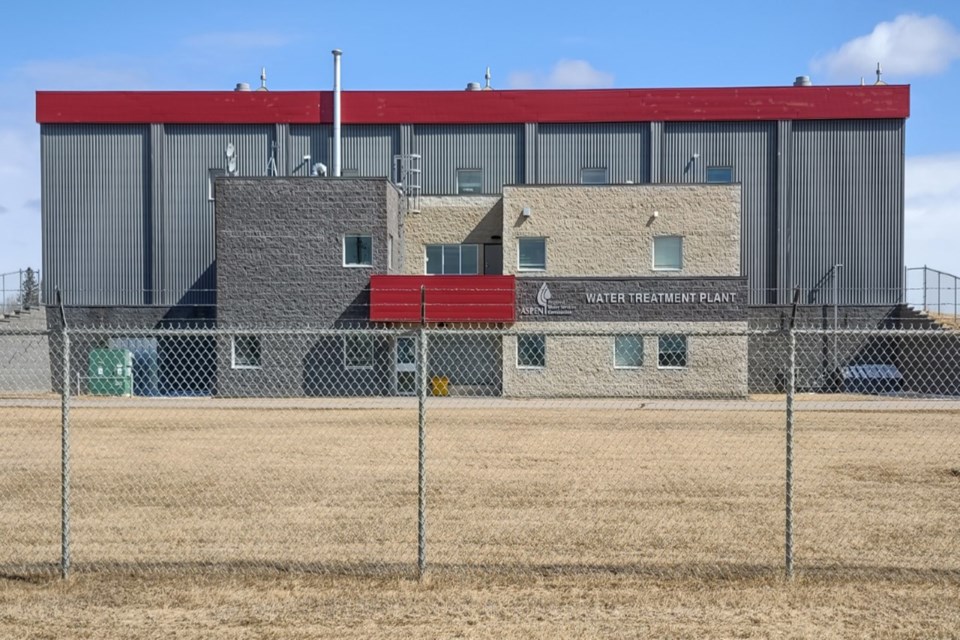ATHABASCA – Aspen Regional Water Services Commission customers, at least in the Town of Athabasca, can expect to see a sharp increase in water rates as the commission begins to rebuild its capital reserves after most of those accumulated went towards the new intake project earlier this year.
Athabasca town councillor Dave Pacholok was elected by members of the commission, which includes representatives from the town, Athabasca County and Village of Boyle, as the new chair Nov. 2, and then took his seat for the first regular meeting of town council later that day, bringing with him a few highlights from the last term with the water commission for new councillors, and a not-so-rosy prediction of a “considerable” increase in water rates in the near future.
“We had a meeting today about the projected wish list for capital projects. It's large,” Pacholok told the new council. “I think this will indicate that when we pass the budget there will be an increase — a considerable increase — in water rates, because we have no monies going forward.”
That increase could be as large as 30 per cent, he said.
“We decided that we must start another big capital reserve in order to alleviate these issues coming down the road, so we may get considerable feedback on this, but we are going to raise the rates and that will have to be considered in budgets,” he said.
Pacholok added the commission is unable to apply for grants, so the member municipalities, which rely on grants, taxes and utility rates to operate, are the only source of funding it has access to, and with the number and amount of grants available through the federal and provincial governments falling, that option is fast becoming unviable.
He also gave an overview of the project that led to the commission’s reserves now being empty. The new intake pipe is installed, and the river work completed, but overall, the long-awaited upgrade to the river intake system at the former water treatment plant downtown is behind schedule, with no date for completion in sight.
Pacholok told the rest of council the current intake line was built in the 60s, and an increasing number of problems over the last few years were putting the region’s water supply at risk, including one instance where a vacuum truck had to be used to clear an unknown blockage, and needed to be able to reach 450 feet into the river to do so.
With the intake pipe not properly screened, the amount of debris entering the facility caused constant problems with the machinery inside, increased overall wear-and-tear and resulted in additional debris being added to the reservoir at the water treatment plant.
“This new line is going to hopefully alleviate a lot of the issues like that, but the problem is that it went from being a $2.7 million job originally … and ended up being a $5 million job,” he said, noting the town was forced to take out a $1.26 million debenture to cover the unexpected jump in costs, which came as a result of the time between when the project was approved, when the grants became available and when the project started.
In addition, well-documented global supply chain issues are delaying the delivery of necessary materials to complete the project.
“The problem being that it's well over budget and we're not done yet. We have contingencies that we're working on and it's looking like we don't have an end to it because we bought a lot of the pumps and a lot of the grinders and sand removers that are on backorder and have been on backorder for months that were supposed to come in in July,” Pacholok said.
“We have no idea where they are or if they are coming. So, the possibility of having to extend the whole project would mean another year of mobilization for the contractor. It would be extra monies having to come out of the water commission, which it doesn't have and is basically coming out of us again.”
The delay will also mean the continued closure of the Rotary Trail on the north side of the facility.
“We're still hoping to get it all commissioned by sometime in the winter, but again, it just makes it more difficult, more expensive, anything that you do in the wintertime, although most of it is going to be done inside for the rest of the way, but if these pumps and separators don’t come you just can’t finish the project,”



